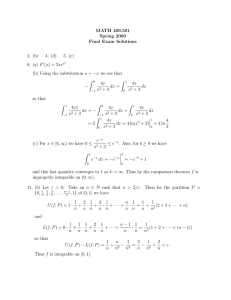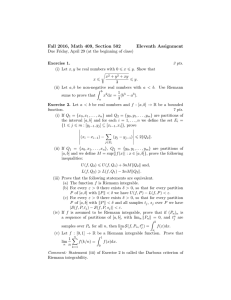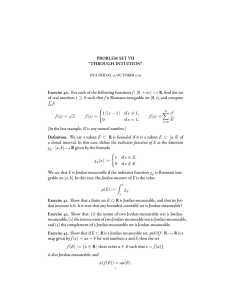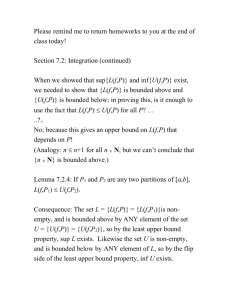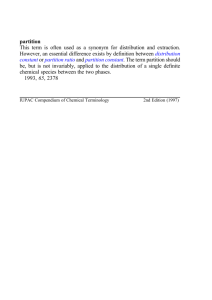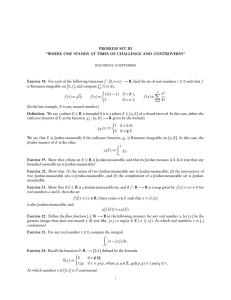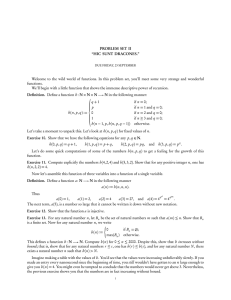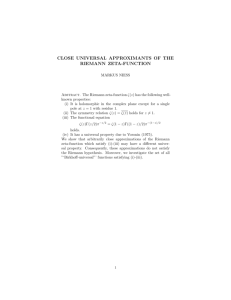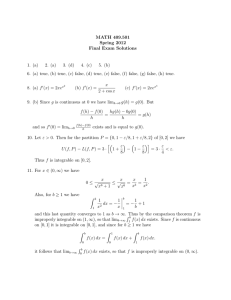Fall 2016, Math 409, Section 502
advertisement
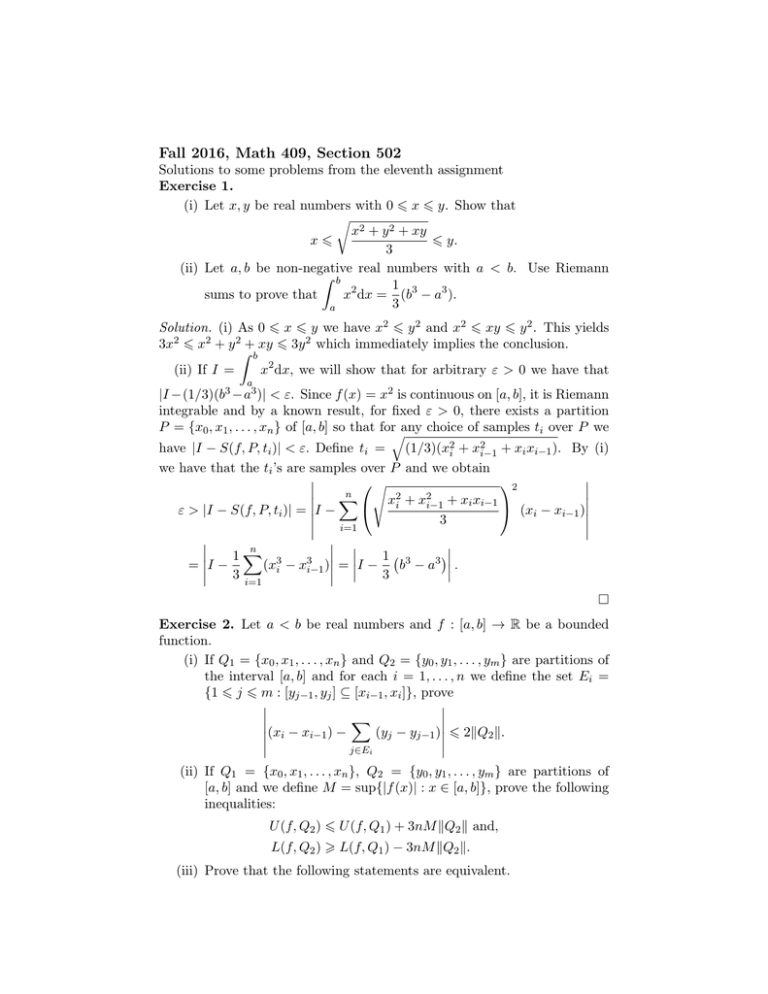
Fall 2016, Math 409, Section 502
Solutions to some problems from the eleventh assignment
Exercise 1.
(i) Let x, y be real numbers with 0 6 x 6 y. Show that
r
x2 + y 2 + xy
x6
6 y.
3
(ii) Let a, b be non-negative real numbers with a < b. Use Riemann
Z b
1
x2 dx = (b3 − a3 ).
sums to prove that
3
a
Solution. (i) As 0 6 x 6 y we have x2 6 y 2 and x2 6 xy 6 y 2 . This yields
3x2 6 x2 + y 2 + xy 6 3y 2 which immediately implies the conclusion.
Z b
(ii) If I =
x2 dx, we will show that for arbitrary ε > 0 we have that
a
|I −(1/3)(b3 −a3 )| < ε. Since f (x) = x2 is continuous on [a, b], it is Riemann
integrable and by a known result, for fixed ε > 0, there exists a partition
P = {x0 , x1 , . . . , xn } of [a, b] so that forqany choice of samples ti over P we
have |I − S(f, P, ti )| < ε. Define ti = (1/3)(x2i + x2i−1 + xi xi−1 ). By (i)
we have that the ti ’s are samples over P and we obtain
s
2
n
2
2
X
x
+
x
+
x
x
i
i−1
i
i−1
(xi − xi−1 )
ε > |I − S(f, P, ti )| = I −
3
i=1
n
1X 3
1 3
3
3 = I −
(xi − xi−1 ) = I −
b − a .
3
3
i=1
Exercise 2. Let a < b be real numbers and f : [a, b] → R be a bounded
function.
(i) If Q1 = {x0 , x1 , . . . , xn } and Q2 = {y0 , y1 , . . . , ym } are partitions of
the interval [a, b] and for each i = 1, . . . , n we define the set Ei =
{1 6 j 6 m : [yj−1 , yj ] ⊆ [xi−1 , xi ]}, prove
X
(xi − xi−1 ) −
(yj − yj−1 ) 6 2kQ2 k.
j∈Ei
(ii) If Q1 = {x0 , x1 , . . . , xn }, Q2 = {y0 , y1 , . . . , ym } are partitions of
[a, b] and we define M = sup{|f (x)| : x ∈ [a, b]}, prove the following
inequalities:
U (f, Q2 ) 6 U (f, Q1 ) + 3nM kQ2 k and,
L(f, Q2 ) > L(f, Q1 ) − 3nM kQ2 k.
(iii) Prove that the following statements are equivalent.
(a) The function f is Riemann integrable.
(b) For every ε > 0 there exists δ > 0, so that for every partition
P of [a, b] with kP k < δ we have U (f, P ) − L(f, P ) < ε.
(c) For every ε > 0 there exists δ > 0, so that for every partition
P of [a, b] with kP k < δ and all samples tj , sj over P we have
|S(f, P, tj ) − S(f, P, sj )| < ε.
(iv) If f is assumed to be Riemann integrable, prove that if (Pn )n is
a sequence of partitions of [a, b], with limn kPn k = 0, and tnj are
Z b
f (x)dx.
samples over Pn for all n, then lim S(f, Pn , tnj ) =
n
a
(v) Let f : [0, 1] → R be a Riemann integrable function. Prove that
Z 1
n
1X
lim
f (k/n) =
f (x)dx.
n n
0
k=1
Solution. (i) Let 1 6 i 6 n. Define j0 = max{0 6 j 6 m − 1 : yj 6 xi−1 }
and j1 = min{1 6 j 6 m : xi 6 yP
j }, note that yj0 6 xi−1 < xi 6 yj1 .
If Ei = ∅, then |(xi − xi−1 ) − j∈Ei (yj − yj−1 )| = |xi − xi−1 | 6 |yj1 − yj0 |.
We claim that 0 < j1 − j0 6 2. Indeed, if this were false then we would
have yj1 −2 , yj1 −1 ∈ [xi−1 , xi ], i.e. j1 − 1 ∈ Ei which is absurd (Ei was
assumed to be empty). Two possible cases remain, namely j1 = j0 + 1 or
j1 = j0 + 2. In the first case, |yj1 − yj0 | 6 kQ2 k, while in the second case
|yj1 − yj0 | 6 |yj1 − yj1 −1 | + |yj1 −1 − yj0 | 6 2kQ2 k. Either way, the conclusion
follows.
If Ei 6= ∅, define j00 = min(Ei ) and j10 = max(Ei ).
P It is an easy observation that for j00 6 j 6 j10 we have j ∈ Ei , i.e.
j∈Ei (yj − yj−1 ) =
Pj10
(y − yj−1 ) = yj10 − yj00 −1 which allows us to conclude
j=j00 j
X
(xi − xi−1 ) −
(yj − yj−1 ) = |(xi − yj10 ) − (xi−1 − yj00 −1 )|
j∈Ei
6 |xi − yj10 | + |xi−1 − yj00 −1 |
Note that yj10 6 xi and if they happen to be equal then |xi − yj10 | = 0,
whereas if yj10 < xi then yj10 < xi 6 yj10 +1 which yields |xi − yj10 | < kQ2 k.
Similarly, we obtain |xi−1 − yj00 −1 | < kQ2 k. The conclusion follows.
(ii) The proofs of the two inequalities are identical, so we only show the
first one. For 1 6 i 6 n define M (f, Q1 , i) = sup{f (x) : x ∈ [xi−1 , xi ]}
and for 1 6 j 6 m define M (f, Q2 , j) = sup{f (x) : x ∈ [yj−1 , yj ]}. If for
1 6 i 6 n we take the sets Ei from question (i), note that for j ∈ Ei we
have M (f, Q2 , j) 6 M (f, Q1 , i). We calculate
U (f,Q2 ) − U (f, Q1 ) =
=
m
X
j=1
M (f, Q2 , j)(yj − yj−1 ) −
n
X
i=1
M (f, Q1 , i)(xi − xi−1 )
=
n X
X
M (f, Q2 , j)(yj − yj−1 ) −
i=1 j∈Ei
X
+
n
X
M (f, Q1 , i)(xi − xi−1 )
i=1
M (f, Q2 , j)(yj − yj−1 )
j ∈∪
/ n
i=1 Ei
6
n
X
M (f, Q1 , i)
i=1
(yj − yj−1 ) −
n
X
M (f, Q1 , i)(xi − xi−1 )
i=1
j∈Ei
X
+
X
M (f, Q2 , j)(yj − yj−1 )
j ∈∪
/ n
i=1 Ei
=
n
X
M (f, Q1 , i)
i=1
+
X
(yj − yj−1 ) − (xi − xi−1 )
j∈Ei
X
M (f, Q2 , j)(yj − yj−1 )
j ∈∪
/ n
i=1 Ei
6 nM 2kQ2 k + #(j ∈
/ ∪ni=1 Ei )M kQ2 k (by question (i)).
To conclude the proof, it remains to observe that there are at most n many
elements in the set B = {1 6 j 6 m : j ∈
/ ∪ni=1 Ei }. Indeed, for j ∈ B
we have that [yj−1 , yj ] is not a subset of [xi−1 , xi ] for any 1 6 i 6 n. This
implies that (yj−1 , yj )∩Q1 6= ∅. Note that the correspondence B → Q1 \{a}
with j 7→ min((yj−1 , yj ) ∩ Q1 ) is one-to-one which yields the desired result.
(iii) The implications (b)⇒(c)⇒(a) are fairly easy, we only prove (a)⇒(b).
Fix ε > 0. By a known theorem, there exists a partition P0 of [a, b] so that
U (f, P0 ) − L(f, P0 ) < ε/3. If M = sup{|f (x)| : x ∈ [a, b]} and P0 =
{x0 , x1 , . . . , xn }, define δ = ε/(9nM ). For any partition P of [a, b] with
kP k < δ, by (ii) we obtain U (f, P ) 6 U (f, P0 )+ε/3 and L(f, P ) > L(f, P0 )−
ε/3. We conclude U (f, P )−L(f, P ) 6 (U (f, P0 )+ε/3)−(L(f, P0 )−ε/3) < ε.
(iv) Let ε > 0. By assertion (b) of question (ii) there exists δ > 0 so that
for any partition P of [a, b] with kP k < δ we have U (f, P ) − L(f, P ) 6 ε/2.
As kPn k → 0, there exists n0 so that for all n > n0 we have kPn k < δ. We
conclude that for n > n0 we have U (f, Pn ) − L(f, Pn ) 6 ε/2. Since the numZ b
bers
f (x)dx and S(f, Pn , tni ) are both in the interval [L(f, Pn ), U (f, Pn )],
a
their distance is at most the length of the interval, i.e. ε/2. We have shown
that for n > n0 we have
Z b
ε
S(f, Pn , tnj ) −
f (x)dx 6 < ε
2
a
which yields the desired result.
(v) For each n ∈ N define Pn = {0, 1/n, 2/n, . . . , (n − 1)/n, 1}, which is a
partition over [0, 1] with kPn k = 1/n, and tni = i/n for i = 1, .P
. . , n, which are
samples over Pn . Observe that for each n ∈ N we have (1/n) nk=1 f (k/n) =
S(f, Pn , tni ). The conclusion follows from question (iv).
